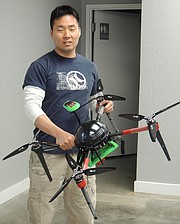New farm-related business features drones
MATTAWA — Suk “Steve” Kim has turned his education from Washington State University and experiences in Iraq and Afghanistan into a new farm-related business based in Mattawa.
Desert Aire Solutions is an aerial imaging service provider and an agricultural drone dealer that helps growers detect stressed areas in growing crops. This is done with a specialized camera system aboard a drone. The practice is not new, but the equipment is – and highly advanced.
“Farmers have used aerial photography for years, but they’ve used airplanes or helicopters,” Kim said.
The multi-spectral camera simultaneously captures five discrete spectral bands. It is produced by Micasense in Seattle. It generally takes 2,000 images of a field of 140 acres.
The drone that carries the camera system is manufactured by Aerial Technology International based out of Portland. Kim is a dealer of the same drone he uses. Farmers can purchase their own customized drones with specialized cameras and bird deterrent systems.
After the drone and camera system do their job, Kim uploads the images to the Micasense uploader. Micasense processes them into a final product and returns that to Kim for delivery to the client.
It’s up to the grower or the grower’s agronomist to read the final image, determine stress areas and what is causing the stress. They determine the stressed areas by the indexed image.
“In most cases, green indicates a healthy plant and red indicates a plant that needs more attention,” Kim said. “But every field is different. Every crop is different. In the case of grapes, you want the plants to have some stress during the ripening period so that the vines will funnel more resources into the fruit instead of leaves. Our images allows the farmers to fine-tune his field. No need to spray the whole field when you can clearly see the particular areas that need improvement.”
Kim is in a partnership with Sun Hwang, owner of several businesses in the community. They became acquainted when Hwang’s wife was Kim’s Sunday school teacher in Yakima decades ago.
When Kim told Hwang about the application he was thinking of for drones, Hwang offered to invest in the idea.
“Why don’t we do it?” he said. “There’s a lot of ag in the Mattawa area.”
Desert Aire Solutions is located at the west end of the Mattawa Market building on Government Way. It opened for business early in March.
Kim invites growers to visit his office to introduce himself. He hopes the service will grow by the results in the field.
Kim was born in Korea. He was still a child when he came with his family to the United States in 1991. He went to school in Yakima.
Kim started his higher education at Western Washington University in 2000 but didn’t finish a degree. After three years, he joined the U.S. Army Reserves as an all-wheeled mechanic.
After completing the training requirements of the reserves, Kim transferred to Washington State University. It had a ROTC program and a computer engineering program.
“I wasn’t even thinking about this (business) in the beginning,” he said.
Kim graduated with a computer engineering degree in 2008 and the rank of second lieutenant in the Army. He is now a captain and plans to complete a 25-year career.
Kim has deployed to Iraq and Afghanistan seven times but, oddly enough, not as a member of the U.S. military. He’s gone as an employee of Insitu/Boeing, which is a civilian contractor involved in the war.
Kim learned about drones after he went to Arizona briefly as part of his officer basic course. He met a warrant officer at the Unmanned Aerial Vehicle (UAV or drone) school.
“He encouraged me to get into drones,” Kim said.
In 2009 Kim hired on with Insitu, a company in Bingen, a little burg at the edge of the Columbia River along Highway 14.
“A lot of the buildings in town used to be rented by our company,” Kim said. “Now they built a nice campus down by the river.”
Kim operates Insitu’s drone Scaneagle in Iraq and Afghanistan in support of U.S. military operations. The goals are intelligence gathering, surveillance and reconnaissance. He operates from the same bases as the military.
“When troops go outside the wire, they try to have us eyes on,” Kim said. “Before soldiers get in their vehicles and drive outside the wire, we’re watching the road ahead looking for anomalies.”
Thanks to drones, soldiers can be alerted to possible ambushes. They can also expect reinforcements or air support to arrive quickly when needed. All of this means fewer casualties.
“We can’t prevent bad things from happening,” Kim said. “But we can help commanders make better decisions.”
Kim noted the Scaneagle can stay in the air more than 24 hours. It flies high enough to escape detection and low enough to get a good picture of the surroundings. It’s color scheme blends in with the sky.
For agricultural work, Kim likes to fly his drones as low as possible for better image quality. He can do good work at about 400 feet above ground.
Kim’s deployments are usually four months in length. He still has his periodic U.S. Army National Guard duties to fulfill.
Kim is still with Insitu, but he will request “at home” status for a while to work on his business. He may eventually leave the company but, for now, he’s ready to go if he’s called to a hot spot.
He’s also ready to go if he’s called to an orchard, a vineyard or a potato field.





